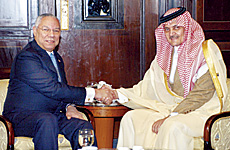BAGHDAD, 24 November 2004 — The international community yesterday threw its weight behind the tight timetable for Iraq’s first post-Saddam Hussein elections.
On the ground, British troops joined their US and Iraqi counterparts in a massive new offensive against insurgent strongholds yesterday as efforts intensified to restore government control in time for the January polls.
The huge operation was launched in the so-called Triangle of Death just south of Baghdad.
Iraq was meanwhile pressing ahead with preparations for January’s elections as world powers and Middle Eastern states, in a rare show of unity, threw their weight behind the ballot planned for Jan. 30.
UN Secretary-General Kofi Annan, speaking at an international conference on Iraq, termed the vote “critical” to quell the violence in Iraq.
The chronic insecurity gripping Iraq was “the greatest impediment to a successful transition process,” he told the meeting in the Egyptian resort of Sharm El-Sheikh.
His stand was enshrined in a declaration that was endorsed not only by the United States but also by its regional foes Iran and Syria, and by critics of the Iraq war including China, France and Russia.
Foreign Minister Prince Saud Al-Faisal emphasized the importance of preserving Iraq’s independence, unity and territorial integrity. “Iraq should be helped to achieve security and stability and go ahead with the political process by ensuring the participation of all groups in the general elections in order to set up a permanent, broad-based legitimate government,” he told the conference.
Prince Saud said freedom and democracy in Iraq could not be achieved by the use of force, but only by reconciliation and participation of all political, ideological and racial factions in the political process. “Along with political aspects in Iraq, attention should also be paid to the country’s reconstruction,” the minister said, expressing his belief that Iraq’s debts would be substantially slashed.
Iraqi officials insist that despite persistent unrest, the vote will be held as planned, and election registration officers said more than 220 different political groups had applied to stand ahead of a Tuesday deadline.
US Marines and a so-called Iraqi SWAT team swept through the village of Jabella just north of the city of Hilla to kick off the fresh offensive to restore control in the northern part of Babil province, the US military said.
The operation, dubbed Plymouth Rock, involved more than 5,000 Iraqi, US and British troops.
Rebels based in a string of Sunni towns immediately south of the capital that command the main highway to the Shiite south have launched repeated attacks against convoys and travelers around the surrounding area.
The operation came hot on the heels of a massive assault on the city of Fallujah, west of Baghdad — the largest since last year’s invasion.
“As the Iraqi people prepare to vote in nationwide elections in January, multinational forces are determined to capture or kill those who desire to destabilize the elections process,” the military said.
Most of Fallujah’s 300,000 inhabitants had fled the city before the assault began on Nov. 8, but as a few rebel pockets were still to be brought under control yesterday, humanitarian needs inside the city remained unknown.
A team from the Iraqi Red Crescent Society entered Fallujah on Monday, but no real assessment has been made of the humanitarian situation since US and Iraqi government troops stormed the city on Nov. 8, the International Committee of the Red Cross said.
US commanders had hoped the Fallujah operation would lead to the capture of Iraq’s most wanted man, Abu Mussab Al-Zarqawi, but the suspected Al-Qaeda frontman is now believed to have fled the city beforehand.
Meanwhile, in the city of Samarra, which was the scene of a previous US-backed counterinsurgency operation in September, five people, including three children, were killed and eight wounded by mortar rounds that struck near a US base.
Further north, the Iraqi National Guard took over responsibility from a South African security firm for protecting key oilfields around Kirkuk yesterday in a bid to stem mounting sabotage by anti-US insurgents, the force’s regional commander said.
The state-owned North Oil Company says it has suffered 100 separate attacks since June that have cost 800 million dollars in desperately needed lost earnings.
— Additional input from agencies


